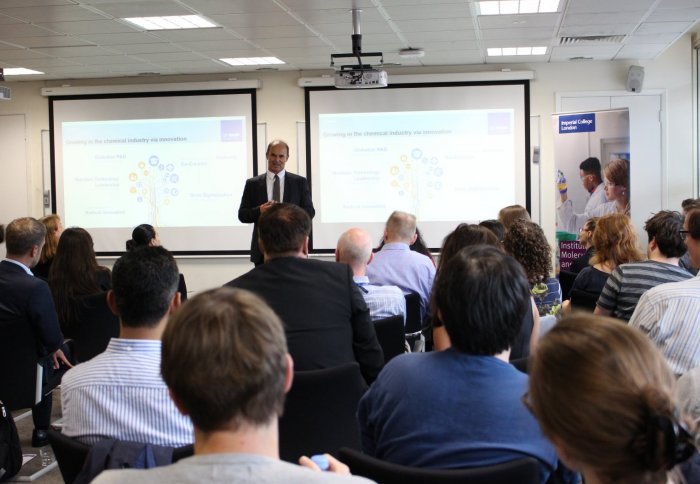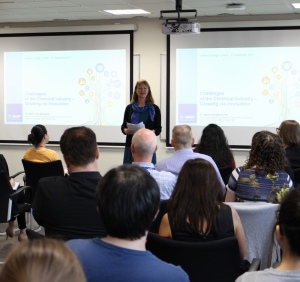Growth via innovation in the chemical industry

Dr Martin Brudermueller
Dr Martin Brudermueller, BASF's Chief Technology Officer, visited Imperial to learn about the College's research, education and innovation activities.
There is much change and uncertainty in the world, and it is important to take stock of the challenges in our sectors and how we are facing them.
– Professor Alice Gast
President, Imperial College London
During a day-long visit to Imperial last week, Dr Brudermüller – who is also Vice Chairman of the Board of Executive Directors at BASF – and his team had the opportunity to tour many of the College’s facilities, on both the South Kensington and White City Campuses, and to discuss the ongoing and productive Imperial–BASF partnership.
A particular highlight of the day was a seminar delivered by Dr Brudermüller and hosted by the Institute for Molecular Science and Engineering (IMSE), entitled ‘Challenges of the chemical industry – growing via innovation’.
Planning for change
Professor Alice Gast, Imperial's President, began the afternoon by welcoming the BASF delegation to College, remarking how pleased she was to "welcome a leader of a great corporation, who is adept at change and will speak to us about innovative approaches to managing change". She highlighted the similarities that Imperial and BASF have in planning for future changes in the world of scientific research and development (R&D). Indeed, Imperial's strong multidisciplinary and integrated approach to the chemical sciences is well matched by BASF's business operations.

Professor Alice Gast
This collaborative ethos is exemplified by IMSE’s aims and activities, as well as the forthcoming Molecular Sciences Research Hub on the College’s White City Campus. This ‘chemistry without walls’ initiative will house the College’s research and innovation communities together in close proximity to corporate partners. In this way, research on many grand challenge problems can be conducted and translated at an accelerated pace.
BASF's industrial perspective on innovation
As the largest chemical producer in the world, BASF’s industrial perspective on the chemical industry – as provided by Dr Brudermüller – was of particular interest and relevance to the 70-strong Imperial audience.
As leading partners in academia and the chemical industry, it is vital that Imperial and BASF continue to work together in the fiercely competitive chemicals market.
– Dr Martin Brudermüller
Vice Chairman of the Board of Executive Directions and Chief Technology Officer BASF SE
With the dramatic, and continuous, rise of Asian R&D markets – especially in China – European companies need to fight ever harder to compete and to maintain their leading positions in innovation.
BASF is thus implementing five levers to foster innovation and drive growth: globalisation of R&D, technology leadership, radical innovation, digitalisation and co-creation. To that end, the company is now operating 70 R&D sites around the world, has recently invested in a new supercomputer, and continues to work on ambitious visionary projects to help drive growth.
BASF–Imperial partnership
As part of their co-creation efforts, BASF’s Academic Partnership Program – UNIQUE – incorporates 15 leading universities from around the world, including Imperial College London. The aims of the Program are to develop lasting relationships, strengthen BASF’s innovation portfolio and enable direct access to scientific expertise, new technologies and talented minds from various disciplines.

Dr Ruth Misener
To illustrate the fruits of the successful collaborations, the IMSE event concluded with four short ‘spotlight’ talks from BASF-funded Imperial researchers. After an introduction by Professor Tom Welton (Dean of the Faculty of Natural Sciences), Professor Nina Thornhill (Department of Chemical Engineering) described the Process Network Optimisation (PRONTO) project. Next, Professor Guillermo Rein (Department of Mechanical Engineering) spoke on the subject of flame retardancy, followed by Professor Jan Cilliers (Department of Earth Science and Engineering) on his team’s Processing Diluted Aqueous Systems (PRODIAS) work. To conclude, Dr Ruth Misener (Department of Computing) talked about her global optimisation research endeavours.
Forthcoming at IMSE
IMSE’s calendar of events for the 2017–18 academic year will continue with the first of a new Highlight Seminar Series. Professor Adah Almutairi from the University of California, San Diego will deliver a talk – ‘Rare earth metals in medicine’ – on 12 October 2017 at 14.00.
IMSE are also excited to be welcoming the first cohort of graduate students to the MRes in Molecular Science and Engineering programme in the coming weeks. During this unique one-year course, the students will be trained to work across the molecular science/engineering interface. They will be equipped with a set of fundamental and applied skills, and their ability for transdisciplinary collaboration will be enhanced through a six-month research project conducted partly at an industrial partner.
Article text (excluding photos or graphics) © Imperial College London.
Photos and graphics subject to third party copyright used with permission or © Imperial College London.
Reporter
Dr Shoshana Z Weider
Faculty of Engineering